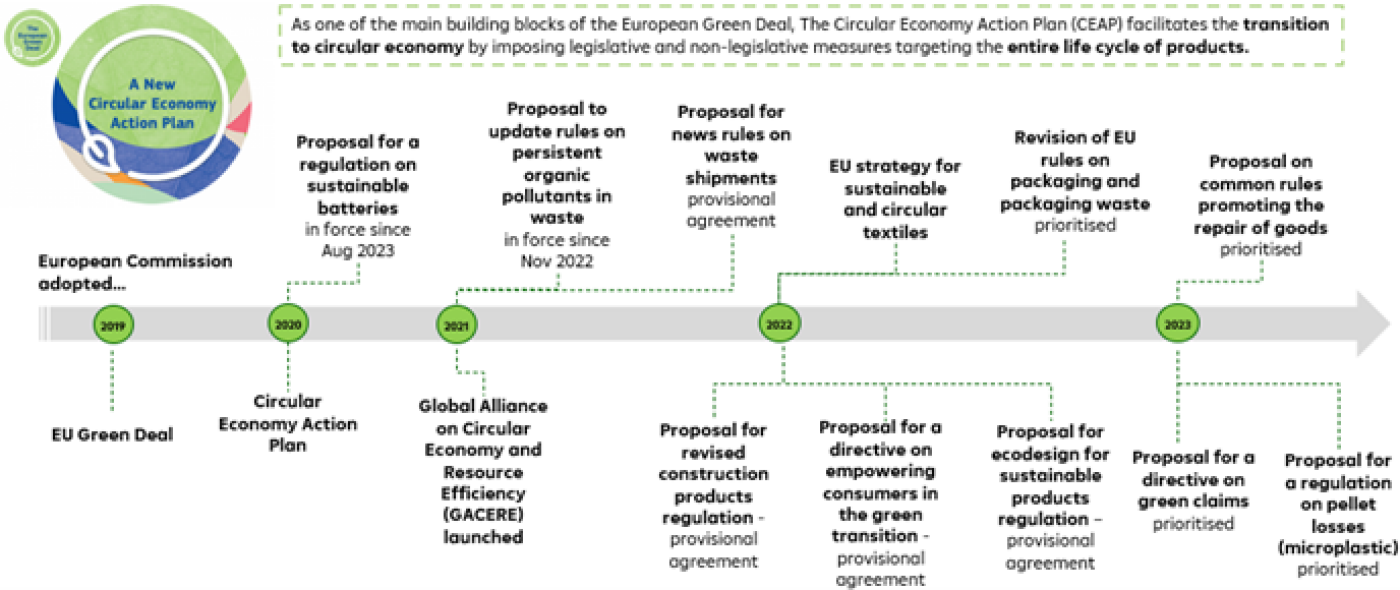
Revolutionising Sustainability: Unpacking the EU's Circular Economy Action Plan
Since its introduction in 2020, the Circular Economy Action Plan (CEAP) has consistently tackled issues such as waste, product design, and consumer information. It is part of the broader initiative, the EU Green Deal, that aims to create a more sustainable and resilient Europe. It is evident from the list of EU Legislative Priorities of the European Parliament, Council and European Commission that components of CEAP are prevalent agenda items for 2024.
A circular economy represents an economic framework strategically crafted to reduce waste and optimise resource utilisation. In contrast to the conventional linear economy, characterised by a "take, make, dispose" approach, a circular economy operates on creating durable products, reusing materials, and recycling to derive optimal value from resources. The regulatory components of CEAP that are already implemented or prioritised in the 2024 agenda are:
Regulation on sustainable batteries (implemented):
Aligned with the European Green Deal, this regulation minimises the environmental impact of battery production and usage, promoting a sustainable battery industry.
Updated rules on persistent organic pollutants (implemented):
Regulators have adopted this regulation to protect human health and the environment from the most harmful chemicals - Persistent Organic Pollutants (POPs) by tightening their limits in waste and preventing them from re entering the economy.
Proposal for new rules on waste shipments (provisional agreement reached):
Under the revised regulation on waste shipments, the Commission proposed stronger rules on waste exports, efficiency of the system for the circulation of waste and determined action against waste trafficking.
Proposal for ecodesign for sustainable products regulation (provisional agreement reached):
This regulation goes beyond ensuring energy efficiency in product design. It tackles product durability, reusability, upgradeability and reparability and the carbon footprint for key products placed on the EU market.
Proposal for revised construction products regulation (provisional
agreement reached):
This proposal for the revision of existing regulation aims to boost the internal market for construction products and ensures that the regulatory environment is fit for making the construction environment deliver on our sustainability and climate objectives.
Proposal for a directive on empowering consumers in their green
transition – (provisional agreement reached):
This directive will include new rules to empower consumers in the green transition so that consumers are informed on the sustainability of products they purchase and therefore be protected against greenwashing.
Revision of EU rules on packaging and packaging waste (prioritised):
Waste, especially packaging waste, is one of the most pressing issues affecting the transition to a sustainable economy. This regulation will ensure reusable packaging options, eliminate unnecessary packaging, limit overpackaging, and provide clear labels to support correct recycling, boost Europe's recycling capacity, and make Europe less dependent on primary resources and external suppliers.
Proposal for a directive on green claims (prioritised):
This directive complements the abovementioned empowering consumers directive by proposing more specific rules on environmental claims (substantiation, communication, and verification).
Proposal on common rules promoting the repair of goods (prioritised):
A prevailing issue hindering the transition to the circular economy is the premature disposal of goods. Under this directive, it will be more cost-effective for consumers to repair than replace goods. Additionally, more demand will boost the repair sector which will incentivise producers and sellers to develop more sustainable business models.
Proposal for a regulation to reduce microplastic pollution from plastic pellet losses (prioritised):
This regulation aims to address and mitigate the impact of microplastics on the environment by restricting intentionally added microplastics, implementing measures to reduce unintentional release, and setting standards and practices for handling plastic pellets, with a focus on critical sources such as tyre abrasion, pre-production plastic pellets, and synthetic textiles.

For inquiries please contact:
regulatory-advisory@rbinternational.com
RBI Regulatory Advisory
Raiffeisen Bank International AG | Member of RBI Group | Am Stadtpark 9, 1030 Vienna, Austria | Tel: +43 1 71707 - 5923